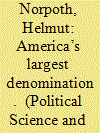| Srl | Item |
| 1 |
ID:
171276


|
|
|
|
|
| Summary/Abstract |
By a measure of religious affiliation used by Gallup polls for nearly a century, the denomination with the largest following in the United States has always turned out to be “None,” ahead of Catholic, Methodist, Baptist, or any other faith. The existence of such a large flock without religious affiliation might be expected for a country with a Constitution guaranteeing freedom of and from religion. The secular portion of the American electorate has always been big enough to wield, potentially at least, political clout. Its partisan attachments have consistently favored the Democratic over the Republican side. What is limiting the electoral clout of the “Nones” today is that nearly half of them profess no partisan affiliation. They are Independents in matters of both church and state.
|
|
|
|
|
|
|
|
|
|
|
|
|
|
|
|
| 2 |
ID:
183774


|
|
|
|
|
| Summary/Abstract |
Governments interact strategically with sovereign bond market creditors: they make choices not only about how often and how much to borrow, but also under what terms. The denomination of debt, in domestic or foreign currency, is a critical part of these terms. The “original sin” logic has long predicted that creditors have little appetite for developing-country government debt issued in domestic currency. Our novel data, including bond issues by 131 countries in 240,000 primary market transactions between 1990 and 2016, suggest otherwise. Domestic-denominated bonds have come to dominate the market, although domestic-currency issuance often is accompanied by shorter bond maturities. We argue that ideologically rooted policy preferences play an important role in this unexpected trend in denomination. All else equal, right governments choose foreign denomination as a means of mitigating currency risk and thus minimizing borrowing costs. In contrast, left governments opt for the flexibility of domestic denomination, and they are better able to act on their preferences in the presence of risk-mitigating monetary institutions and macroeconomic stability. We find support for our argument that partisanship has a robust and enduring relationship with denomination outcomes, even in a marketplace in which domestic-denominated developing-country sovereign bonds have become the norm.
|
|
|
|
|
|
|
|
|
|
|
|
|
|
|
|